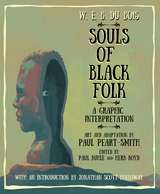
Unlike Du Bois's more scholarly work, Souls blends narrative and autobiographical essays, and it continues to reach a wide domestic and international readership. This moving homage to black life and culture and its sharp economic and historical critique are more important than ever, resonating with today's unequivocal demand that Black Lives Matter in the twenty-first century.

Published in 1903, The Souls of Black Folk by W. E. B. Du Bois was a landmark achievement, moving American philosophy beyond the structures of pragmatism and positivism as it addressed new questions about American social and political history. One hundred years later, Du Bois's classic has clearly resonated through twentieth-century thought, offering a critical perspective on the political, social, and economic barriers imposed upon blacks in America.
This important new book is the first collection of essays to examine sustainedly The Souls of Black Folk from a variety of disciplines: aesthetics, art history, classics, communications, history, literature, music, political science, and psychology. The authors establish a call-and-response rhythm as they examine the critical depth of a text that has had a profound influence on African American intellectual history. Implicitly, the essays show how The Souls of Black Folk has influenced teaching practices and suggested alternative ways of teaching that create a pedagogy of inclusion.
The Souls of Black Folk remains a text pivotal in the American understanding of the black experience, and this important collection investigates this masterpiece from fresh directions. Scholars, teachers, and students of American studies and African American studies will find this remarkable work an essential overview of a book that changed the course of American intellectual history.

Peart-Smith’s graphic adaptation provides historical and cultural contexts that bring to life the world behind Du Bois’s words. Readers will get a deeper understanding of the cultural debates The Souls of Black Folk engaged in, with more background on figures like Booker T. Washington, the advocate of black economic uplift, and the Pan-Africanist minister Alexander Crummell. This beautifully illustrated book vividly conveys the continuing legacy of The Souls of Black Folk, effectively updating it for the era of the 1619 Project and Black Lives Matter.
READERS
Browse our collection.
PUBLISHERS
See BiblioVault's publisher services.
STUDENT SERVICES
Files for college accessibility offices.
UChicago Accessibility Resources
home | accessibility | search | about | contact us
BiblioVault ® 2001 - 2024
The University of Chicago Press









